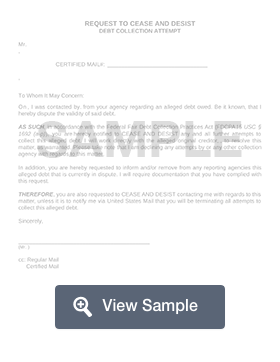Cease and Desist Collections Letter Form
A cease and desist collections letter is a letter used by an individual or business. It informs the debt collections agency, individual, or other business that they must stop attempting to collect on an alleged debt. Generally, this letter is used to stop debt collectors from calling to harass someone at their home or on the job. By law, when debt collectors are notified to stop calling a debtor, they must comply or they could face legal repercussions.
What is a cease and desist collections letter?
A cease and desist letter can be used to stop someone from being harassing when it comes to debt collection. This letter can stop these debt collection calls and serve as a record of filing a complaint about collection calls and contacts.
The letter should include specific details about the nature of the phone calls and the frequency with which they are being received. Any documented proof or records can be attached to the letter as well. The sender should include a date by which the collection calls should be stopped before further action will be taken.
A letter can be sent without legal representation, although if the actions do not cease after the letter has been sent, you may wish to seek legal counsel. Be sure to have a detailed account of the activities and keep a copy of communications with the debt collector.
Once you have sent a written cease and desist letter to a debt collector, they must stop calling you according to the Fair Debt Collection Practices Act.
Other Names
- Cease and desist letter debt collection

Create a Cease and Desist Collections Letter in minutes with our professional document builder.
When should you send a cease and desist letter?
You should send a cease and desist letter to stop debt collectors from harassing you. If a debt collector is calling repeatedly, making threats, or using profane language, a cease and desist letter can stop the collector from harassing you.
You should also send a cease and desist letter if the statute of limitations has expired. If you default on a debt, the creditor has a certain amount of time to file the lawsuit against you to collect it. This period of time is known as the statute of limitations. If the statute of limitations has passed, the creditor cannot sue you to collect the debt. If the statute of limitations has passed, it may be a good idea to send a cease and desist letter to stop the collection calls.
You may also choose to send a cease and desist letter if the debt collector is contacting your about a debt that is not yours.
Components of a cease and desist letter debt collection
- A cease and desist letter should contain:
- Current date
- Name and address of debt collector
- Account or reference number
- Instructions to stop collections calls
Legal Considerations
Pros and Cons of telling a debt collector to stop contacting you
If you tell a debt collector to stop calling you, they are required to under the Fair Debt Collection Practices Act (FDCPA). If they continue to contact you after you send a cease and desist letter, you can sue for a violation of the FDCPA and ask for money damages.
However, if you tell the debt collector to stop contacting you, you should be aware that this will not eliminate the debt. Also, if you are stopping the debt collector from contacting you, they will be left with no other recourse than to sell the debt to another collector or file a lawsuit against you. This means, if you send a cease and desist letter, you may increase the likelihood that the debt collector will pursue legal action against you to collect the debt.
Accounts have exceeded statute of limitations
If you defaulted on your debt and your state’s statute of limitations has passed, the debt collector can no longer sue you to collect your debt. A statute of limitations means that the creditor only has a certain amount of time to file the lawsuit against you to collect it.
Handling Collections Calls
If a debt collector contacts you while you are at work, a verbal request for them to stop calling you should work. If you advise a debt collector to stop calling you at work and they continue to do so, you should document the call and contact a law firm that specializes in the Fair Debt Collection Practices Act.
Sending and Receiving Cease and Desist
If you decide to send a cease and desist letter, you should include the following information:
- Date
- Name
- Address
- Phone number
- Debt collector’s name
- Debt collector’s address
- Account number
Notification that you are requesting that the cease communications with you in relation to the alleged debt pursuant to your rights under federal debt collection laws and that you will report them to a consumer financial protection bureau if the calls do not stop
You should send your letter via certified mail with return receipt requested.
Note that a cease and desist letter only applies to the company that you send it to. If a debt collection company sells your debt to another debt collection agency, you will need to send a new cease and desist letter. Also, a cease and desist letter only applies to third-party debt collectors; it does not apply to the original creditor that you owe money to.
